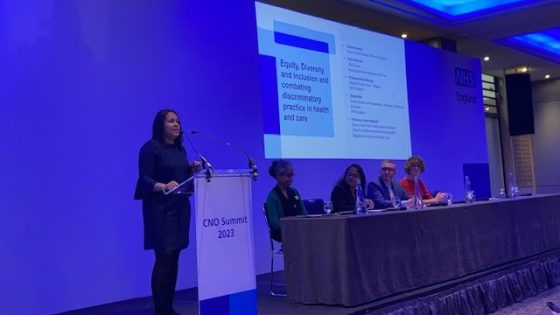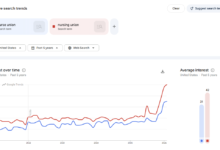‘Critical imperative’ for nurse leaders to keep focus on EDI

Senior nurses in England have been urged to retain a focus on equality, diversity and inclusion (EDI) in their workplaces and to protect staff and patients from the “devastating” impact of discrimination.
The call to action was made today at the chief nursing officer (CNO) for England Dame Ruth May’s annual summit being held in London.
“Whilst we are here to do our best to progress in our careers, we’re not here as tokens”
Karen Bonner
A panel discussion on EDI was opened by Acosia Nyanin, one of Dame Ruth’s deputy CNOs.
Addressing the room of senior nurses and nurse directors, Ms Nyanin said: “Discrimination of any kind, racism, is unacceptable and it has no place in our professions or the NHS and health and care.
“But we know that is exists and that the impact on our colleagues can be devastating.”
She added that this was an issue “close to my heart” as a dual heritage nurse leader.
“We have a critical imperative to address the issues that our staff, colleagues and population are experiencing in our services,” she said.
“We need to take urgent, proactive and sustained action and measures to advance equity, equality, diversity and eliminate discrimination because quite frankly it is a serious public health issue.”
While recognising that a lot had been achieved to date on improving EDI in the NHS, Ms Nynanin said there was “a hell of a way to go”.
The public health implications of discrimination and inequity were backed up by panel member Professor Jamie Waterall, deputy chief public health nurse for England.
Professor Waterall said that “you’ve only got to look at the data to realise it is a public health issue”.
Sharing just two examples, he noted that people living in the most deprived populations were 3.2 more likely to die prematurely than those in wealthiest areas, and that those living with a serious mental health issue were five times more likely to die early than those without one.
He said in some places, EDI was still seen as a “tick box exercise” and that this was “unacceptable” and needed to be challenged.
The diversity of the health workforce was described by Professor Waterall as a “real asset” that should be harnessed when attempting to improve EDI.
Data was also “really critical” to monitor the situation, he said.
He added: “We’ve got to get to a stronger position at which we can benchmark and understand, are we making progress?
“And I think there’s a lot we can learn from that public health approach from the EDI perspective of understanding [if we are] genuinely making a difference and how we can benchmark and understand the impact.”
“There is a lot of noise out there about EDI and about why it’s not needed and about why it doesn’t have an impact”
Deepa Nair
Karen Bonner, chief nurse at Buckinghamshire Healthcare NHS Trust, issued an appeal to chief nurses in the room to hold a focus on EDI.
“As a chief nurse, it’s really important to me to work on this issue, because I think it’s really important for all of us,” she said.
“My call to action to everyone in this room is for us all to do that.”
She added: “Individually, we’re all responsible in this room to do better by the people that we care for and those who work for us.”
Ms Bonner noted how, when she became chief nurse at Buckinghamshire Healthcare in 2020, she was one of only 10 nurse directors in the NHS in England from a Black, Asian or minority ethnic background – she is now one of 20.
Despite the improvement, she noted how representation of minority ethnic leaders on boards was still behind that in the wider workforce (13% versus 24%) and therefore there was “so much more” to do.
Ms Bonner went on to stress that minority ethnic nurse leaders “were not here as tokens”.
She shared how she had received comments when appointed in her current role that she was the “diversity hire” and that she “only got my job because I’m Black”.
“I’ve got a very diverse chief nursing office [team] and they too have heard they only got their jobs because their chief nurse is Black. Now, that’s just not acceptable,” added Ms Bonner.
“Because whilst we are here to do our best to progress in our careers, we’re not here as tokens.”
Also on the panel was Deepa Nair, deputy director of programmes – workforce, training and education at NHS England.
Ms Nair is leading on the EDI improvement plan published by NHS England in June.
She also echoed the importance of data and said she wanted to see more data translated into “insights” about EDI.
For example, she suggested “comparing operational performance to workforce experience – not agency spend, not numbers on boards, but workforce experience and the impact on productivity”.
“Because I think what gets missed out is if you don’t feel empowered, if you don’t feel yourself when you’re at work, there is an impact on productivity, and that needs to be measured and discussed at leadership meetings to then try and address that,” said Ms Nair.
She also urged senior nurses in the room to “shield” their staff from anti-EDI rhetoric.
“Being an umbrella for the staff who you work for is really important,” she said.
“There is a lot of noise, and I say noise intentionally; there is a lot of noise out there about EDI and about why it’s not needed and about why it doesn’t have an impact.
“And to be able to be the buffer can be hard, but it needs to be done to support the staff that work for you.”
Asked about other changes that could be made, Ms Nair said greater accountability was needed to keep organisations in check on EDI.
She added that EDI issues for international staff was also an area that “we really need to focus on”.
According to Ms Nair, latest research showed that UK educated nurses were earning around 20% more than those educated overseas, and she said: “That’s something we need to address.”
The call for focus on EDI follows a letter sent in October by now-former health and social care secretary Steve Barclay asking health bosses to cease hiring dedicated EDI leads.






